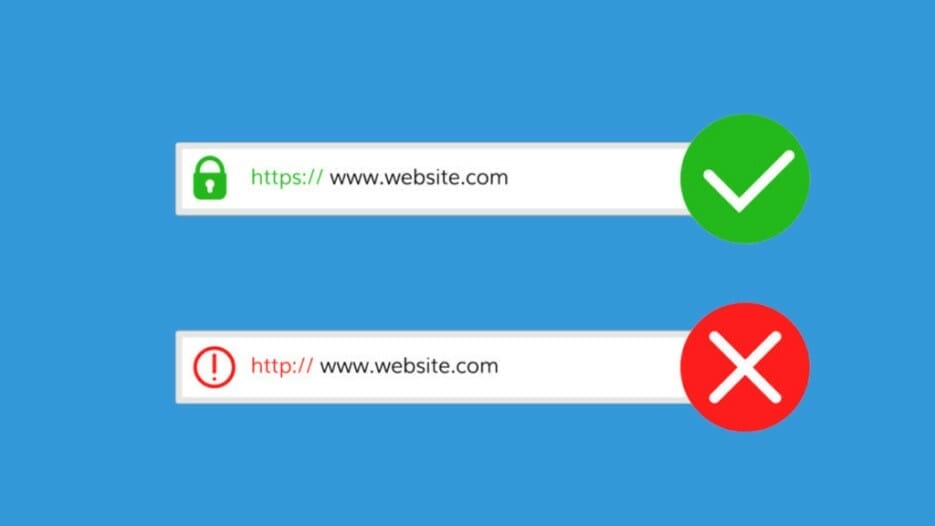Everyone who is connected to the Internet can become a target for cybercriminals and hackers. It might surprise several readers to hear that approximately 30,000 websites get hacked daily.
Another interesting stat is that nearly 64 percent of companies have already experienced a cyber-attack.
This is one of the major reasons why businesses of all types and sizes should consider using SSL certificates on their websites. However, some business owners might not know what SSL is or how it can protect their websites from data breaches and other cyber-attacks.
There is no denying that internet security is a major concern for all businesses. Several business owners and analysts often ask whether HTTPS can be hacked and whether upgrading to HTTPS from HTTP by using an SSL certificate is enough to protect their website.
Most of you would probably know SSL and other digital certificates are essential for securing communications. Unfortunately, there has been a significant increase in digital certificate attacks, which has left several businesses concerned.

The Increase in Digital Certificate Attacks
As mentioned earlier, digital certificates serve the crucial purpose of securing online communications. However, they can also be targets for hackers and cybercriminals.
SSL and other digital certificates enable businesses to build authenticity and trust for users worldwide. Digital certificates authenticate websites, software solutions, and secure email.
These digital documents can be issued to a web server, private company, or person by a CA or Certificate Authority.
Digital certificates are a hot target for hackers and cybercriminals for several reasons. However, the main reason is that they are widely trusted. This is because digital certificates verify that the organization or person is genuine and ensure that the digital certificate really belongs to them.
As a result, end-users will believe that their browsing session, which is protected by SSL or any other digital certificate, is a secure and secure environment where they can share their personal information, including financial details, without any worries.
Attacks on digital certificates can be carried out for several reasons. For instance, hackers may leverage intercepted or stolen digital certificates to improve malware diffusion or to make sure that anti-malware solutions, anti-virus, and other traditional security tools will not identify their attacks.
Several phishing campaigns have leveraged genuine SSL certificates to seem authentic and genuine. This tactic is reportedly used in MiTM attacks, economic fraud, and cyber warfare to deliver malware into the victim’s system.
Is Too Possible to Hack SSL Certificates
If you have installed an SSL certificate on your website, you may be wondering if it is as infallible as everyone claims. In other words, you may be wondering if the SSL certificate on your website can be hacked.
Indeed, it is not technically possible to hack SSL certificates because the chances of it happening are very slim. To simplify things, we will discuss why SSL certificates are hard to compromise in this article. If you are planning to purchase an SSL certificate, then we will explain how you can strengthen its effectiveness.
SSL Certificates Will Not Prevent Your Website from Getting Hacked
SSL certificates ensure that the connection between the web server and the client is encrypted via the TLS (Transport Layer Security) Protocol. In other words, SSL certificates guarantee that any communication that is sent over the encrypted connection can be read only by the recipient and the sender.
This means that unauthorized individuals will not be able to intercept messages transmitted over an encrypted connection. SSL certificates mainly protect communications and keep information private and safe.
SSL certificates will not help businesses prevent their websites from getting hacked, although they do play a critical role in website security.
However, they are not a single-stop solution that will help you to keep your website away from hackers.
If budget is your concern, you should invest in a single domain SSL and expect your website to be secure and safe. Besides an SSL certificate, you will need to implement several other security measures.
The Hackability of SSL Certificates
It is important to address the possibility of SSL certificates getting hacked. In fact, this is something all business owners should consider when looking to offer adequate protection for their website.
As discussed earlier, the chance of SSL certificates getting hacked is very low, but it isn’t impossible.
In TLS 1.3, digital messages sent between a web server and a browser will be encrypted using a 256-bit private key, which refers to the strength and length of the private key.
Hackers who are planning to crack a private key will have to identify 2×256 number combinations, which is almost 115 quadrillion different combinations. It will be hard for humans to identify the right combination and crack the private key.
Several experts in website and data security believe that quantum computers might one day be able to do it.
However, the ones that are currently available in the market cannot do that. So, you don’t really have to worry about someone hacking the SSL certificate on your website.
Tips To Strengthen Your SSL Certificate
It is highly unlikely that the SSL certificate on your website will get hacked. That said, there are several other ways to compromise SSL and digital certificates. Here are some of the best ways to strengthen your SSL certificate.
Protect The Private Key
Hackers and cybercriminals will not have to guess anything if they get access to your private key. If you feel that your private key has become compromised, then it is best to reissue your SSL certificate as fast as possible.
Disable TLS Protocol’s Older Versions
The SSL certificate on your website is only as strong as the site’s server configurations. Therefore, you will need to ensure that the settings support just TLS 1.3 and 1.2 and that the older versions of the TLS protocol are disabled.
SSL Renewals
If your website’s SSL certificate expires before you can renew it, it will be vulnerable to MiTM (man-in-the-middle) attacks. So, you will need to check the expiration date of the SSL certificate and renew it at least a few days in advance.
Final Thoughts
From this article, you would have probably understood that it is nearly impossible to hack SSL certificates. That said, it is crucial to take the necessary steps to ensure your website is fully protected.
If you want to avoid cyberattacks, you should also stop relying solely on an SSL certificate for website protection.














